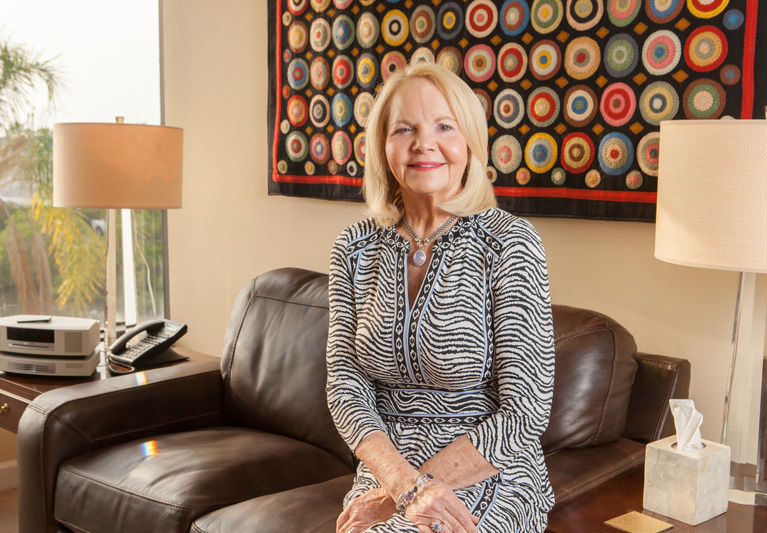
If someone asked you if loneliness and social isolation reduce the quality of a person’s life, you’d probably intuitively say yes. You’d be right, but a report released by Brigham Young University this year goes one step further; it says there’s a link between a lack of connectedness and early mortality, with a risk factor comparable to obesity.
Dr. Lynn Williams, a licensed clinical health psychologist and family psychiatric nurse practitioner with a private practice on the barrier island, says “There is absolutely a connection between social isolation and a person’s physical health. It’s been shown in a number of studies.” She says the impact can be on a number of levels—metabolic, hormonal, and cellular.
The researchers did what’s called a meta-analysis. They looked at 70 studies conducted from 1980 to 2014 and pooled the results, while controlling for variables such as age, gender, socioeconomic status and pre-existing health conditions.
There are biological reasons for the significant impact loneliness can have on physical health, especially for older people. Loneliness can disrupt sleep, elevate blood pressure, exacerbate depression, and increase levels of the stress hormone cortisol. Dr. Williams says it can also lower resistance to infection.
Moreover, isolation tends to deepen habits that have harmful physical effects, like smoking and excess consumption of alcohol.
The impact of social isolation on cognition is dramatic. “People who are isolated tend to lose their ability to think critically,” Dr. Williams says. “They are no longer as able as they once were to analyze and synthesize information from different people and different situations.” Dr. Williams says the strongest commonality among people who reach the age of 100 is their social connectedness. “You rarely see a very old total recluse,” she says.
One of the study’s findings is that the number of people who feel lonely appears to be rising. Study co-author Tim Smith says: “Not only are we at the highest recorded rate of living alone across the entire century, but we’re at the highest recorded rates ever on the planet. With loneliness on the rise, we are predicting a possible loneliness epidemic in the future.”
A 2010 study from the University of Chicago showed a dramatic difference in the rate of physical and mental decline between lonely people and those who are “socially engaged.” The study also showed that extreme loneliness increased an older person’s risk of premature death by 14%, nearly as significant a factor as having a disadvantaged socio-economic status.
The University of Chicago study also outlined three “core dimensions” to healthy relationships:
• Intimate connectedness. Having someone in your life who affirms who you are.
• Relational connectedness. Having mutually rewarding face-to-face contact with people.
• Collective connectedness. Feeling you are part of a group “beyond individual existence.”
Dr. Williams says she gives advice to her patients who express feelings of loneliness or social isolation on a case-by-case basis. “It really depends on the situation and what is causing the isolation,” she says. “And my advice is geared to where their interests are, or were.”
Dr. Williams will not start with a recommendation that the person join a club, as that can be too overwhelming. “I often tell them to just get into the environment, to go where people are.” That might be people-watching at Starbucks or on the boardwalk at Jaycee Park, “to connect through observation.”
A next step may be to go to a movie; Dr. Williams recommends comedies, as shared laughing is part of the human experience.
If the person is an animal lover, Dr. Williams might suggest they volunteer a few hours a week at the Humane Society in Vero Beach or at H.A.LO. Animal No-Kill Rescue Shelter in Sebastian. For those who can’t be (or don’t want to be) around animals, there are plenty of other local volunteer opportunities; a list can be found at: www.verobeach.com/clubs_nonprofit_organizations.html.
Dr. William spoke of the need all humans have for physical touch, preferably that of other humans. “It has a great impact on health, and the lack of a physical connection, can cause a ‘failure to thrive’ in older people,” she says. A pat on the back, a light hug, even a brief entwining of hands can provide a feeling of connectedness.
Dr. Williams’ office is located at 725 Flamevine Drive in Vero Beach; her office phone is 772 234 4511.
The Humane Society of Vero Beach is located at 6230 77th Street; the phone number is 772 388 3331.
The H.A.L.O. No-Kill Rescue Shelter is located at 710 Jackson Street in Sebastian; the phone number is 772 589 7297.



